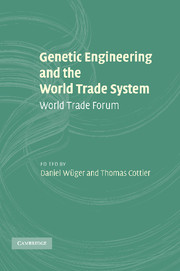Book contents
- Frontmatter
- Contents
- List of contributors
- List of abbreviations
- PART I Introduction and systemic issues
- 1 The many faces of modern biotechnology
- 2 Genetic engineering, trade and human rights
- 3 Gender dimensions of biotechnology policy and trade
- PART II Intellectual property and gene technology: issues at stake and possible options
- PART III Food security, trade and agricultural production with genetically modified organisms
- PART IV Food safety, international trade and biotechnology
- PART V Medical research, cloning and international trade
- Index
1 - The many faces of modern biotechnology
Published online by Cambridge University Press: 06 October 2009
- Frontmatter
- Contents
- List of contributors
- List of abbreviations
- PART I Introduction and systemic issues
- 1 The many faces of modern biotechnology
- 2 Genetic engineering, trade and human rights
- 3 Gender dimensions of biotechnology policy and trade
- PART II Intellectual property and gene technology: issues at stake and possible options
- PART III Food security, trade and agricultural production with genetically modified organisms
- PART IV Food safety, international trade and biotechnology
- PART V Medical research, cloning and international trade
- Index
Summary
Introduction
The current debate on the implications of modern biotechnology for humans and agriculture epitomises the philosophical dividing lines of modernity. On the one side are fears that modifying DNA endangers life as such. The term ‘life’ is used in an almost metaphysical way to refer to something unchangeable, perfect, whose integrity has to be preserved at any cost. Any interference with life is strictly taboo and DNA is at the core of it. These views seem to be based on a strict separation between nature and technology. With nature, perfect as it is, one may not interfere or doom is certain – as if our actions can be separated from what nature does, or as if the secret code of our well-being has been enshrined in DNA.
On the other side there is a strongly held belief in the capacity of science and technology to modify biological processes in whatever way would benefit humanity. From this viewpoint scientists do nothing that does not also occur in nature. Any unintended consequences can be controlled by technological means, i.e. there are no unknown or uncontrollable risks either to human health or to the environment – as if our actions could not have any unintended consequences that technology would not be able to deal with.
A compromise between these positions is hardly attainable.
- Type
- Chapter
- Information
- Genetic Engineering and the World Trade SystemWorld Trade Forum, pp. 3 - 16Publisher: Cambridge University PressPrint publication year: 2008



